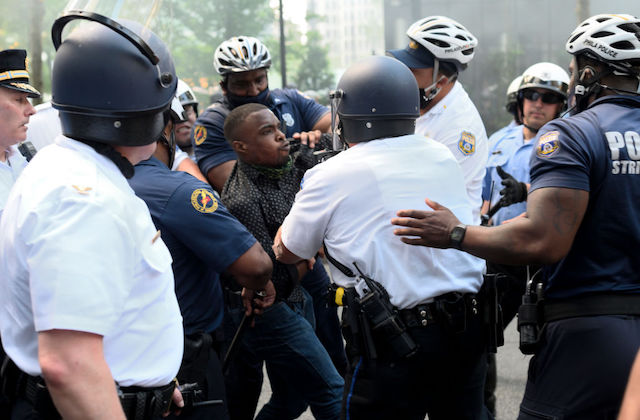Just kidding, guys. Nothing to see here.
The authors of a controversial, misguided paper on racial bias and police shootings have requested a retraction of their work, which they describe as “careless,” because of its “continued misuse in the media” in the wake of global protests sparked by the murder of George Floyd, Retraction Watch reports.
Reports Retraction Watch:
The 2019 article in the “Proceedings of the National Academy of Sciences” (PNAS), titled “Officer characteristics and racial disparities in fatal officer-involved shootings,” found “no evidence of anti-Black or anti-Hispanic disparities across shootings, and White officers are not more likely to shoot minority civilians than non-White officers.” It has been cited 14 times, according to Clarivate Analytics’ Web of Science, earning it a “hot paper” designation.
The paper’s co-author Joseph Cesario, a researcher at Michigan State University, spoke to Retraction Watch, saying he and his co-author, David Johnson from the University of Maryland, College Park, have submitted a formal request to PNAS for a retraction. According to Retraction Watch, the co-authors wrote in their request:
We were careless when describing the inferences that could be made from our data. This led to the misuse of our article to support the position that the probability of being shot by police did not differ between Black and White Americans (MacDonald, 2019). To be clear, our work does not speak to this issue and should not be used to support such statements. We accordingly issued a correction to rectify this statement (Johnson & Cesario, 2020).
Although our data and statistical approach were valid to estimate the question we actually tested (the race of civilians fatally shot by police), given continued misuse of the article (e.g., MacDonald, 2020) we felt the right decision was to retract the article rather than publish further corrections. We take full responsibility for not being careful enough with the inferences made in our original article, as this directly led to the misunderstanding of our research.
Princeton professors Jonathan Mummulo and Dean Knox tell Retraction Watch this retraction request is an important step toward setting the record straight. “We appreciate the authors’ willingness to take this action,” they told Retraction Watch in a statement. “We hope readers and policymakers will now cease relying on this paper when considering the critical issue of racial bias in policing.”
The editor in chief of PNAS, May Berenbaum, told Retraction Watch in a statement that her team is “working to publish the [retraction] as quickly as possible.”
